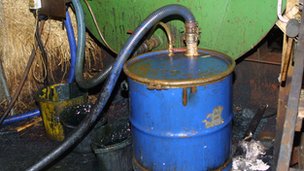 A special task force is needed to combat organised cross-border gangs involved in fuel-smuggling and ‘illicit trade’, say politicians north and south of the border.
A special task force is needed to combat organised cross-border gangs involved in fuel-smuggling and ‘illicit trade’, say politicians north and south of the border.
Yesterday a committee of Irish and British politicians called for more determined action north and south of the border in a report highlighting the need for more serious penalties, including more lengthy custodial sentences for illicit trade activities, “in order to make the island of Ireland a more difficult place for criminal gangs to operate”.
The British and Irish Political Assembly says it is particularly alarmed by the evidence of the widespread presence of fuel laundering plants and filling stations selling illicit fuel in border regions and further afield.
They says the problem is worst in south Armagh and Monaghan and met with the heads of councils in Monaghan, Donegal and Louth.
The Report stresses that “those involved must not be allowed to continue this illegal activity and every possible effort must be made by law enforcement authorities in their collaborative efforts to shut down these operations, despite the difficulties in policing some of these areas.”
Financial firm Grant Thornton estimated that fuel-laundering alone was worth somewhere between €140-260 million a year in losses to Revenue.
Other recommendations include that stations convicted of selling illegal, laundered, or stretched fuel “cannot simply reopen after a few weeks”, that on-the-spot fines be brought in for consumers knowingly buying illicit goods and more funding for enforcement.
The Chair of Committee A Senator Paul Coghlan says: “Illicit cross-border trade, particularly in fuel and cigarette smuggling, is a huge issue impacting on the lives of citizens and small businesses on both sides of the border.
“This report focuses on how the PSNI and An Garda Síochána, and the Northern Ireland Executive, Irish Government and other law enforcement agencies, work together, particularly in light of the devolution of policing and justice powers and the launch of the Cross-Border Policing Strategy in 2010. The Committee was hugely encouraged by the on-going positive cooperation in this area and believes that its series of practical recommendations, if implemented, can build on this good work,” he said.
Major players in the operation include Minister for Justice and Equality, Frances Fitzgerald TD, Minister for Justice, David Ford MLA, the Garda Commissioner, Nóirín O’Sullivan; the Chief Constable of the Police Service of Northern Ireland (PSNI), George Hamilton; members of An Garda Síochána and the PSNI; the Chief Executives of Monaghan, Louth and Donegal County Councils; Members of the PSNI in Crossmaglen and members of an Garda Síochána in Dundalk; representatives of the Retailers Against Smuggling and the Petrol Retailer’s Association; and from Grant Thornton Ireland who produce an annual report on the fiscal losses incurred as a result of illicit trade.

